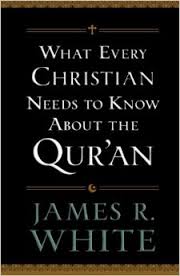I would like to make a plug for James R. White’s book, What Every Christian Needs to Know About the Qur’an. It is a valuable resource, both for the Christian, as well as the Muslim, in understanding the background, historical context, and claims of the Quran.
I will include here an excerpt from the section of the book entitled, The Quran’s Stand Against History:
“When it comes to the cross, the Qu’ran stands firmly and inalterably against the mass of historical evidence and the almost universal view of the populace of its day. But it does so in only one ayah (verse), one single verse, of forty Arabic words. It provides no explanation, no context, no defense. Here is the text:
4:156. And because of their disbelief and of their speaking against Mary a tremendous calumny.
157. And because of their saying: “We slew the Messiah, Jesus son of Mary, Allah’s Messenger.” They slew him not, nor crucified him, but it appeared so to them; and those who disagree concerning it are in doubt thereof; they have no knowledge of it except the pursuit of a conjecture; [but] certainly they slew him not.
158. But Allah raised him up to Himself. Allah is August, Wise.
…So there forty Arabic words stand alone in the Qur’an. They stand alone without commentary in the hadith literature as well. They stand against not only the natural reading of other Qur’anic texts but also against the entire weight of the historical record. Forty Arabic words written six hundred years after the events they describe, more than seven hundred fifty miles from Jerusalem. Forty Arabic words that are not clear, not perspicuous, and yet this is the entirety of the foundation up which the Islamic faith bases its denial of the crucifixion, and hence, resurrection of of Jesus Christ.
Consider, in closing, what this says about the Qur’an. Nothing in it suggests its author had even the slightest knowledge of the New Testament centrality of God’s redeeming act of Christ on the cross. The author knew nothing of Paul’s epistle to the Romans or the book of Hebrews and their in-depth case for and teaching about the Messiah’s redeeming death. The author seems blissfully unaware for the evidentiary mountain that substantiates the crucifixion. And yet with a few seconds of oral recitation, the Qur’an places itself, and all who would believe in it, in the direct opposition not only to the Injil (Gospel) but also every thing history itself says on the subject. The question must be asked: Who, truly, is following mere conjecture here? Those who were eyewitnesses on the Hill of the Skull outside of Jerusalem? Or the author of the Qur’an, more than half a millennium later?” (end of excerpt) [1]
[1] James R. White, What Every Christian Needs to Know About the Qur’an, pg. 137, 142, Bethany House Publishers, 2013
For more on this topic see the following articles on this site:
The question: Why was Jesus crucified? ‘What think ye of Christ? Whose son is he?’-Matt. 22:42
Historicity of the Crucifixion & the Law of Non-contradiction









